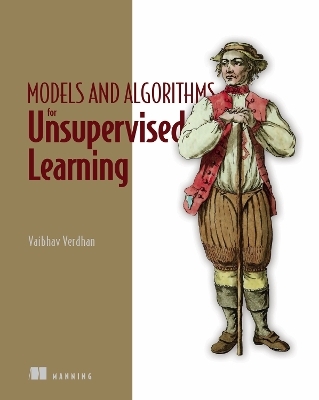
Data Without Labels
Manning Publications (Verlag)
978-1-61729-872-1 (ISBN)
- Noch nicht erschienen (ca. Juni 2025)
- Versandkostenfrei
- Auch auf Rechnung
- Artikel merken
In Models and Algorithms for Unsupervised Learning you'll learn:
Fundamental building blocks and concepts of machine learning and unsupervised learning
Data cleaning for structured and unstructured data like text and images
Unsupervised time series clustering, Gaussian Mixture models, and statistical methods
Building neural networks such as GANs and autoencoders
How to interpret the results of unsupervised learning
Choosing the right algorithm for your problem
Deploying unsupervised learning to production
Business use cases for machine learning and unsupervised learning
Models and Algorithms for Unsupervised Learning introduces mathematical techniques, key algorithms, and Python implementations that will help you build machine learning models for unannotated data. You'll discover hands-off and unsupervised machine learning approaches that can still untangle raw, real-world datasets and support sound strategic decisions for your business. Don't get bogged down in theory—the book bridges the gap between complex math and practical Python implementations, covering end-to-end model development all the way through to production deployment. about the technology Unsupervised learning and machine learning algorithms draw inferences from unannotated data sets. The self-organizing approach to machine learning is great for spotting patterns a human might miss. about the book Models and Algorithms for Unsupervised Learning teaches you to apply a full spectrum of machine learning algorithms to raw data. You'll master everything from kmeans and hierarchical clustering, to advanced neural networks like GANs and Restricted Boltzmann Machines. You'll learn the business use case for different models, and master best practices for structured, text, and image data. Each new algorithm is introduced with a case study for retail, aviation, banking, and more—and you'll develop a Python solution to fix each of these real-world problems. At the end of each chapter, you'll find quizzes, practice datasets, and links to research papers to help you lock in what you've learned and expand your knowledge.
Vaibhav Verdhan is a seasoned data science professional with rich experience across geographies and domains. He has led multiple engagements in machine learning and artificial intelligence. A leading industry expert, Vaibhav is a regular speaker at conferences and meet-ups and mentors students and professionals. Currently he resides in Ireland where he works as a principal data scientist.
table of contents PART 1 BASICS READ IN LIVEBOOK 1INTRODUCTION TO MACHINE LEARNING READ IN LIVEBOOK 2CLUSTERING TECHNIQUES READ IN LIVEBOOK 3DIMENSIONALITY REDUCTION PART 2 INTERMEDIATE LEVEL READ IN LIVEBOOK 4ASSOCIATION RULES 5 CLUSTERING TECHNIQUES (ADVANCED) 6 DIMENSIONALITY REDUCTION (ADVANCED) 7 UNSUPERVISED LEARNING FOR TEXT DATA PART 3 ADVANCED CONCEPTS 8 DEEP BELIEF NETWORKS 9 AUTOENCODERS FOR IMAGES 10 GAN FOR TEXT AND IMAGES PART 4 END-TO-END MODEL JOURNEY 11 END-TO-END MODEL JOURNEY
| Erscheint lt. Verlag | 1.6.2025 |
|---|---|
| Verlagsort | New York |
| Sprache | englisch |
| Themenwelt | Mathematik / Informatik ► Informatik ► Netzwerke |
| Mathematik / Informatik ► Informatik ► Programmiersprachen / -werkzeuge | |
| Informatik ► Theorie / Studium ► Algorithmen | |
| Informatik ► Theorie / Studium ► Künstliche Intelligenz / Robotik | |
| ISBN-10 | 1-61729-872-7 / 1617298727 |
| ISBN-13 | 978-1-61729-872-1 / 9781617298721 |
| Zustand | Neuware |
| Haben Sie eine Frage zum Produkt? |
aus dem Bereich


